#vocabulary lesson
Text
Language Learning Recommendation: Wikipedia
⎯⎯⎯⎯⎯
This is something I only realized I could use more recently and I haven't seen someone mention it so I thought I should; Wikipedia can be a great resource to learn specific vocabulary and can be really helpful if you are pursuing a translation specialty like medicine or politics as Wikipedia has endless amounts of articles about those topics. (Sometimes Wikitionary will also have definitions for things you are looking for as well)
We all know that Wikipedia is full of information in English but has thousands of articles in other languages as well. On English articles all you have to do to change the language is select the language button at the top right of the screen and select another language. However, not every wikipedia article is translated from English, and some articles exist without an English translation. Also, even though there are many translated articles, many will not be an exact 1:1 translation and can be missing a lot of information but it is a very good tool when wanting to learn the meaning of words that might not be in an online dictionary.
For example: Here is the article "First Secretary of State" in English:
⎯⎯⎯⎯⎯
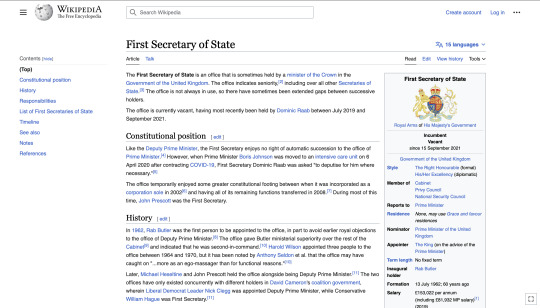
⎯⎯⎯⎯⎯
In the top right corner you can see a tab that says "15 languages", this clearly means that there are 15 different languages to choose from that the article is translated into. (On another article the number will change depending on how many languages it has been translated into, of course)
⎯⎯⎯⎯⎯

⎯⎯⎯⎯⎯
Now, if you click this button and select Chinese, the page will look like the picture below. This clear as day has shown me now that the correct word for "First Secretary of State" in Mandarin would be "首席大臣" and it also states the English version of the word in the translated article although some articles may be missing this function. ALSO, if you find an article in Chinese or another language first, the language tab is on the bottom left corner instead of the top right.
⎯⎯⎯⎯⎯
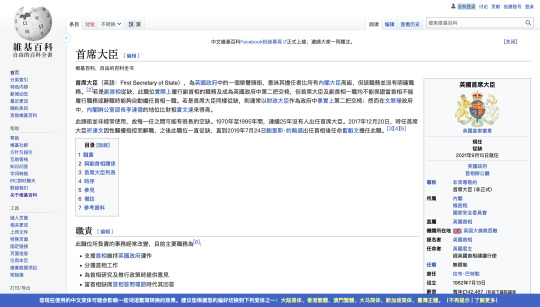
⎯⎯⎯⎯⎯
To find how to pronounce the Mandarin words you find (that aren't already in online dictionaries) in Mandarin you can use websites like MDBG or Chinese Converter that will show you individual pronunciations for characters. Even Google Translate is quite reliable for pinyin but in Chinese Converter and Google Translate sometimes they do not pick up characters with multiple pronunciations correctly or ignore tone change rules.
For Japanese you can use websites like Nihongo Dera's Kana Converter or Jisho to figure out pronunciations.
I could make a whole post in itself for how to figure out pronunciations for words in languages you don't natively speak so I'll stop here.
I hope this post helps someone :)
⎯⎯⎯⎯⎯
$5 translation commissions here
#language learning recommendation#recommendation#language resources#language reference#language resource#language learning resources#language learning#vocab list#vocabulary#vocabulary lesson#learning resources#learning reference#learn mandarin#mandarin learning#translation studies#wikipedia#fun facts#learn languages#foreign languages#language study#study resources
76 notes
·
View notes
Text
youtube
#Sentence Analogy 2 || Beginning Level#antonyms#synonyms#vocabulary lesson#wordss to learn#new words#learn new wwords#comparing relationships#meaning of words#words in a sentence#Youtube
0 notes
Photo
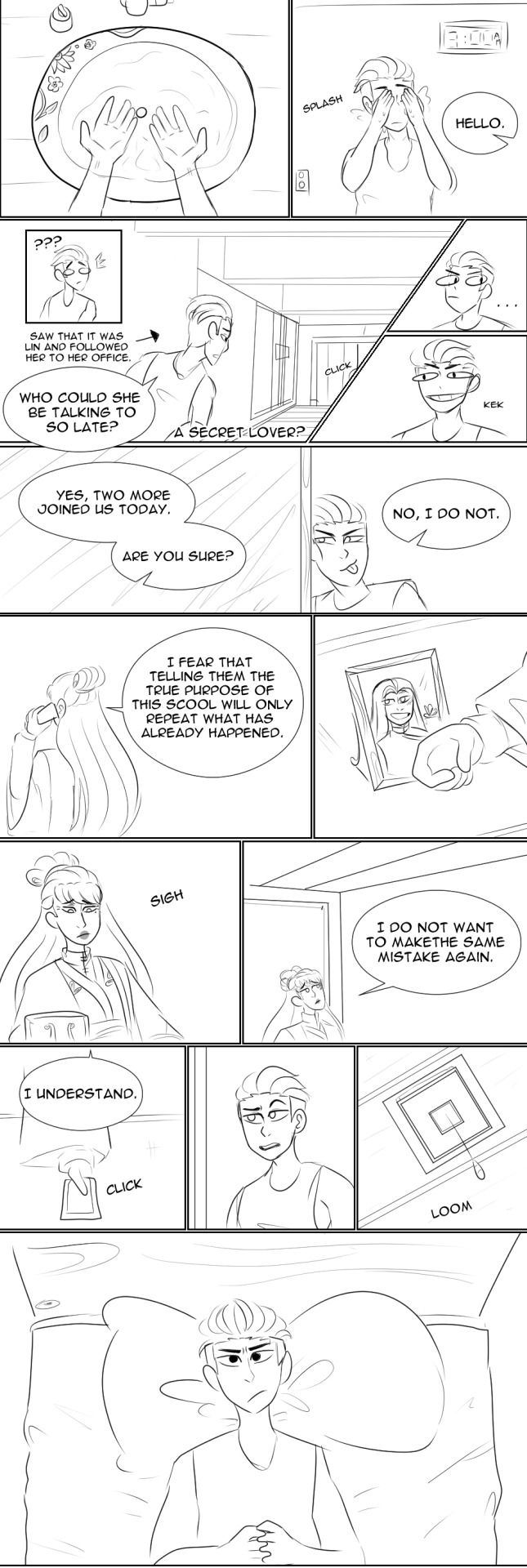
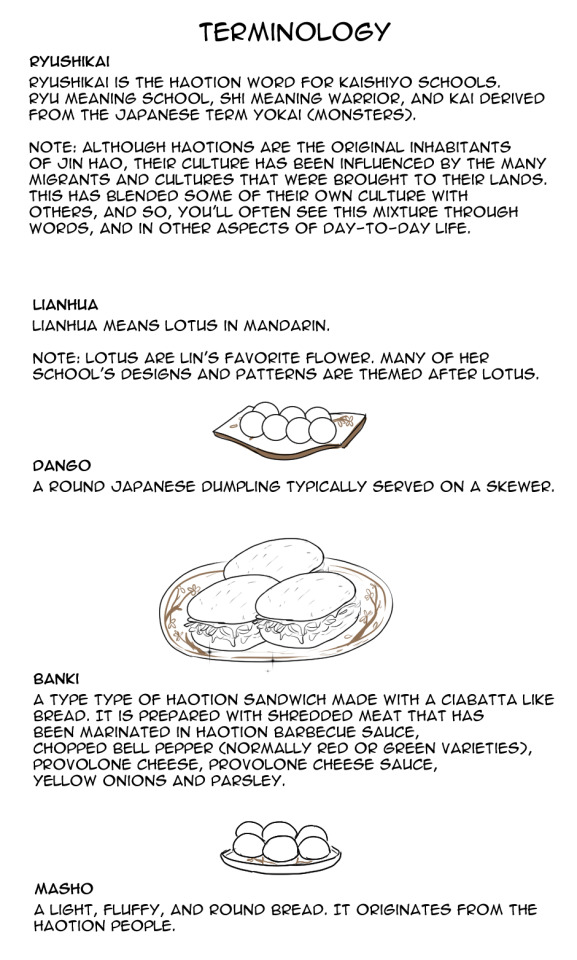
Jin Hao | Ch. 2 | New Beginnings (61 n 62)
Read on Tapas or Webtoons!
1 note
·
View note
Text
it's time to move "vocabulary mixup lessons with sao" from twitter to tumblr!
today's common fanfic fuckup that slays the man:
flout: to disobey or avoid
flaunt: to loudly/ostentatiously display
these two are very disconcerting to see mixed up!! you don't USUALLY "flaunt" the rules, and you certainly don't "flout" your new outfit!
684 notes
·
View notes
Text

me: hmm let's check out some of doc's older stuff, could be nice background noise while I work
also me: 32 episodes deep and invested in his farming simulator 2013 playthrough
#come watch farm sim 2013 we get storytime with doc and german vocabulary lessons#i now know what a Mähdrescher is#shame i don't have german in my curriculum anymore. woulda flexed on all my classmates with this newly aquired knowledge#all of this /may/ have been put in motion by me seeing @/potionofinstantdamage's personal doc lore on one of their posts. possibly.#docm77#docm77 fanart#farm sim 2013#hermitblr#thatnerdydino art
862 notes
·
View notes
Text

bit of homework (plural bits of homework). (Britain, slang) meaning an attractive woman.
Synonym: piece of homework
Tbh, I’ve always had a thing for Jakes, too.
#endeavour morse#itv endeavour#shaun evans#vocabulary#a way with words#endeavour pbs#jack laskey#peter jakes#inspector morse#morseverse#english lesson#i think i have a thing for him too
37 notes
·
View notes
Text
vocab list: 미술
그림: painting, picture, drawing, sketch, illustration
페인팅: painting (영어)
페인트칠: painting (한국어)
그리다: to paint, draw, sketch a picture
끌다: to pull, draw/attract (someone's attention)
긋다: draw a line
만들다: to make (a movie, book, song), produce, direct (a movie), compose (a song)
사진: picture, photo
영화: picture, video, movie, film
영상: picture, video, image (shown on a screen)
화면: picture, image (space filled by a photo)
그림자: shadow, silhouette, reflection (on a mirror/water)
그늘: shade, dark part
미행: shadowing (secretly following someone to keep an eye on them or get evidence)
느끼다: to feel (experience an emotion in one's mind), realize, being aware of
기분: mood, feeling, atmosphere (the situation surrounding)
감정: emotion, feeling (towards a certain incident or person)
도자기: pottery, ceramics, chinaware (도기 is a bowl made of clay, and 자기 is baked at a higher temperature-1200°C-)
도예: abbreviation of '도자기 공예' -ceramic arts-
도기: pottery, earthenware
회: raw fish, round (ONLY when it's added to a number, aka a counter)
둥근: round, spheroid
차례: order, turn
계속: continuosly, consecutively
형태: shape, form, figure, appearance (of an object)
모양: shape (outer appearance/aspect) -mostly used-
형성하다: to form, build, develop a certain character or form
생기다: to be formed, come into being (something that didn't exist to come into existence)
예술: art (very broad sense, including music, painting, sculpture, architecture)
미술품: art work, fine art, work of art
미술: art (painting and sculpture)
기술: technology, skill, technique
닦다: to clean, scrub, wipe
양치: brushing teeth
붓: writing/painting brush
빗다: to brush/comb one's hair
비디오: video
텔레비전: TV
녹화: video, record, tape, videotape
무비: movie
원: circle; ₩
돌다: to turn, rotate, spin; to go around, circle
그룹: group, a circle (of people)
사회: society, circle
잉크: ink
서명하다: to sign
서명: signature, autograph
먹물: black ink (ink + water), squid ink
광장: square, plaza
사각형: square, quadrangle, tetragon, quadrilateral
평방: square (ej metros cuadrados)
제곱: square (of -maths-)
네모: square
조각: piece (of), slice; sculpture, statue
작품: piece (of music), work (of art); product, production
부분: piece, part, section, portion
하나: one, piece
하나씩: one by one, one at a time, piece by piece
일부: some/any part, portion, section, partially, partly
즐기다: to enjoy (oneself), have fun
하세요: do it, allowing someone to do something
누리다: authority to enjoy what you have in life; to enjoy someone's rights or benefits
즐겁게: delightfully
재미있다: funny, interesting, amusing, entertaining
점토: clay
진흙: mud
춤: dance (dynamic, b-boing, -방탄소년단-)
무용: dance (soft movement -ballet-)
추다: to dance
페인트: paint (pintura)
칠하다: to paint, coat, varnish
물감: paint, dye (to draw a picture or dye cloth)
색칠하다: to paint, color (something)
크레용: crayon
~을 크레용으로 그리다: to draw with crayons
~을 사생하다: to draw exactly as it is (not used in conversational korean)
주변 경치를 사생하다: draw exactly how it is viewed
사생대회: drawing/painting contest
납작한: flat (to be)
평면: plane/flat surface
아파트: flat, apartment
시시한: flat, petty, small minded; insignificant, trivial
한 푼 없는: have no money
포스터: poster
영화계: the film world (-hollywood-)
박막: a thin film (anatomical jargon)
촬영: shooting, filiming
필름: film (영화 필름, 카메라 필름, 휴대폰 액정보호 필름, etc)
행동하다: to act, behave
법률: law, act, legislation
연기하다: to act, perform (personality, behavior, etc of a role); to delay, postpone
행위: act, action (with intention, will)
대행하다: to do something for someone
source: 영단어는 관리다 app

#study#korean#koreanlanguage#koreanstudy#koreanstudying#한국어#한국어연습#한국어공부#한국어공부중#한국어배우기#korean language#한국어 배우기#한국어 공부하기#korean learning#korean langblr#learn korean#korean lesson#korean words#korean voca#korean vocabulary list#korean vocab#korean vocab list#korean vocabulary#한국어 단어#한국어 배우다#한국어 공부#한국어 어휘
298 notes
·
View notes
Text
wow duolingo sucks so bad these days
#it's so gamified and competitive and full of ads and if you run out of hearts you can't even do anything for hours#it's just mindless repetition and learning to recognise the shape of words without having to think about it#anyway i started learning russian on wlingua app and it's 100000 times better#no ads and it actually teaches you grammar alongside vocabulary#with spaced repetition and a logical structure of lessons#and also reading comprehension exercises and writing exercises#so you actually learn how to write the words unlike in duolingo?#well i suppose duolingo also has the option to type with a keyboard#but the bird app sucks in many other ways
139 notes
·
View notes
Text
I love love love that the ccs will be forced to use the translator in order to communicate with the new ccs joining qsmp because that’s what it’s there for!!!!! it’s a translator!!! use it to translate, even if both of you are able to speak the same language!
I don’t see enough people use the translator, especially when the ccs are both able to speak (usually) english, and it’s still great that they can speak easier if they speak the same language, but the language barrier is one of the causes for the creation of the qsmp! Let the language barrier be a barrier in the first place, and let the translator do the work it was meant to do!
Let people who physically can’t speak the same language interact! It’s part of what makes qsmp qsmp, and even though it has impacted hugely just from adding people who generally create content and talk in different languages, I do think it somewhat lacks in the people speaking different languages category, because while that is true, it is also somewhat untrue in that all of the ccs can speak one of the same language (usually english), even if they’re not a natural at it!
Now, that’s not a bad thing at all! But, it does blur the speaking different languages problem that was meant to occur in qsmp. They speak different languages! Let them speak whatever language they want and let the translator do the work! Again, that is what it is there for! It is a translator! (I’m looking at you twitter)
And even if it takes a million repeats of the same sentence for someone to finally get what another person is trying to say, a hundred fuck-ups of the translation or a thousand language barrier/cultural miscommunications, again, qsmp was made for this to happen! It was made so people who come from different backgrounds and are usually unable to interact because of cultural/language barriers can interact, whether it start out negative or positive!
And I trust them (the ccs and fans) to communicate if controversy/confusion happens culturally and language-wise, and (hopefully) for the fans to not turn anything minor** into a huge drama, so I am extremely excited to see the ccs be forced into using the translator!
#I love love love when people use the translator so much like YOU CAN SPEAK DIFFERENT LANGUAGES AND STILL UNDERSTAND EACHOTHER#I just find it so fucking cool as someone who can only speak english fluently#qsmp#qsmp 2024#I love hearing people talk in their native langauges even if I don’t understand shit it’s like woah you can speak and understand this whole#vocabulary without a second thought and I can’t??? Speak to me more in hopes that I will someday because I WANT TO#I want to learn languages so bad but I am caught between two to learn first because i cannot speak my own secondary language that more than#50% of my relatives CAN so I’m like I should learn that first but also spanish french and portuguese is RIGHT THERE and the one I should#learn first is so much harder to learn because of accessibility to lessons and just people who can teach it in general and also school lol#I’m not gonna say the language because I’m 90% sure nobody will know what it is but it is a tonal language which makes it much harder to#learn
31 notes
·
View notes
Text
Korean Weather Vocabulary
Watch my lesson on weather in Korean: https://www.youtube.com/watch?v=D0V_FJsVzkI
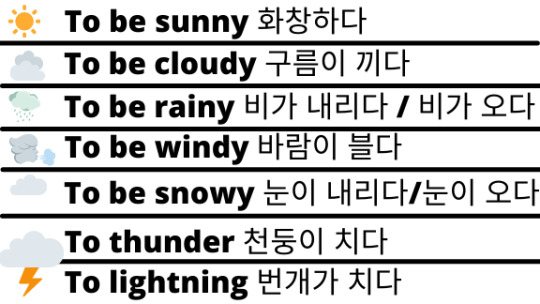
#korean lesson#learn korean#korean#korean vocabulary#korean vocab list#korean vocab#beginner Korean#beginner korean lesson#Korean language#language learning#learning korean#languageblr#language study#langblr#weather in Korean
46 notes
·
View notes
Text
[Japanese→English] @panmaumau Tweet — Color Coded Translation

————————————————————————
何も知らない生き物の顔
なにもしらないいきもののかお
The face of a living thing that doesn’t know anything.
————————————————————————
Please correct me if I made a mistake
#color coded translation#japanese#japanese vocabulary#study japanese#japanese lesson#easy japanese#beginner Japanese#learning japanese#japanese lingblr#japanese linguistics#learn japanese#japanese langblr#japanese learning#japanese language#japanese vocab
103 notes
·
View notes
Text
Vocabulary, Hanja, & Charts Masterlist
Click here for the masterlist of all my lessons!
Vocabulary
Must-Know People
Must-Know Places
Must-Know Things
Must-Know Verbs
Must-Know Adjectives
Countries
Months, Days of the Week, and More
Clothing (옷)
School (학교)
Autumn (가을)
Autumn (w/Pictures!)
More Questions
House / Apartment (집 / 아파트)
Emotions / Feelings ( 감정)
Animals (동물)
Loan / Konglish Words
Food and Drink (먹을 것과 마실 것)
Parts of the Body (몸)
Counters
Modes of Transportation (교통 수단)
Colors (색깔)
Colors (with Pictures!)
Weather (날씨)
Winter (겨울)
Music & Instruments (음악과 악기)
Baking Gingerbread Cookies
Emergency (비상)
Hygiene & Bathroom (위생 & 화장실)
Indefinite Pronouns
Work / Office (일 / 사무실)
Spring (봄)
Coronavirus Prevention (코로나바이러스 방역)
How to Wash Your Hands (손을 씻기)
Time (시간)
Korean Cuisine (한식)
Summer (여름)
Summer (여름) w/Pictures!
Graduation (졸업)
Identity (독자성)
Korean Text Slang
Similar Words
Makeup w/Pictures! (화장품)
Family (with Pictures!)
Pronouns
How to Say “Still” and “Already” in Korean
Tastes & Textures (맛과 질감)
K-Pop Audition
K-Pop Fandom Terminology
Different Ways to Say “Change”
Flower Names
What Does 원래 Mean?
What does 오히려 Mean?
College
Hanja Lessons
최
수
악
식
급
동
부 & 불
애
출
퇴
예
음
중
학
습
연
생
대
입
인
문
감
과
원
특
만
후
무
Charts
Present, Past, and Future Tense
Question Words
잘 vs. 못 and Negative Conjugations
Future Tenses
-았/었던 vs. -던 (at end of lesson)
Particles
Some 받침 Rules
Giving Commands
Conjunctions and -아/어/여서 vs. -(으)니까
-(으)면 vs. -다/라면 and Different Ways to Say “And”
How to Say “Or” (at end of lesson)
Telling Time (at end of lesson)
Comparatives and Superlatives
잘하다 & 못하다 vs. 잘 하다 & 못 하다 (at end of lesson)
Comparing 잘하다/못하다, 잘 하다/못 하다, & 수 있다/수 없다
Irregular Verbs
#korean#korean language#korean vocab#korean vocabulary#hanja#langblr#korean langblr#learn korean#learning korean#study korean#studying korean#korean lesson#korean resource#한국어#한국어 어휘#한자#한글#한국어 공부하기#한국어 배우기#한국어 레슨
310 notes
·
View notes
Text
Ukrainian 101, Lesson 39 : Back to School
Школа - shkola - school
Університет - ooneeversytet - university
Семестр - semestr - semester
Навчальний рік - navchalnyi reek - academic year
Урок - oorok - lesson (at school)
Пара - para - lesson (at university or college)
Перерва - pererva - break
Іспит, екзамен - eespyt, examen - exam
Есе - esse - essay
Підручник - peedroochnyk - textbook
Викладач - vykladach - university or college 'teacher', professor
Вчитель - vchytel - school teacher
Професор - professor - professor
Спеціальність - spetsialneest - major
Олімпіада - olimpiada - olympiad

#ukrainian language#ukrainian#ukrainian101#ukrainian lesson#ukrainian vocabulary#learning languages#language learning#ua lang#ukraine#langblr#slavic languages#learnsomethingneweveryday#learning#self studying#polyglot#Language blog#foreign languages#learnukrainian#learn ukrainian#backtoschool#back to school
37 notes
·
View notes
Text
Mon journal français

"L'affirmation et la négation" class
aAfirmative and negative sentences (excercises)
Translated one book Page "Le Petit Prince"
#[🥐]'`Aujourd'hui#french#français#french language#french learning#french lessons#french vocab#french vocabulary#language learning#languages#learning french
15 notes
·
View notes
Text
the way i can see ted following in his father's footsteps after that finale
Edit: ok I've had some sleep and took some time and I don't actually think that. I still agree with the tags though
#he was not happy. HE WAS NOT HAPPY#he never learned the lesson they kept hitting us over the head with. that he needed to let people in and accept help#which was said by his mum in the pub and sorta referenced when higgins said that the way to grow as a person was to accept help#the last two episodes only emphasized the way richmond was where he belonged. he was integrated with the community he had a support system#he knew the vocabulary he finally understood football#“they say there's no place like home but there's no place like richmond”#and then he just. leaves.#he arrives to the sound of a song about a father pushing social morms and conformity onto his kid#and the show closes with his face. hes smiling but it doesn't reach his eyes.#the final song is about a person who has never been brave enough to fight for what the wanted#hes coaching a little league football team. emulating to same thing he did in richmond. and it feels empty#it feels fake. like the idyllic suburban neighborhood#compared to the bright community of richmond#fuck#ted lasso spoilers#ted lasso
47 notes
·
View notes
Text
Grammar: I want to...
2023년 6월 29일
안녕하세요!
Today we will learn how to say "i want to + verb" in Korean! It's really easy, but of course, we will have to learn some verbs at the same time. Don't worry, it's very easy!

To say "i want to" in Korean, we use verb + -고 싶어요.
VERB STEM + -고 싶어요
For example:
가다 (to go).
I want to go will be "가고 싶어요"
As you can see, we have to take out "다" and change it with "고" and then add 싶어요.
More examples:
보다 (to see) = 보고 싶어요 (i want to see/look/watch)
먹다 (to eat) = 먹고 싶어요 (i want to eat)

Sometimes, you can use the word "more" to say "i want to eat more", "please give me more", and we will use "더". And we place it at the beginning.
먹고 싶어요 = I want to eat.
더 먹고 십어요 = I want to eat more.
주세요 = Please give me.
더 주세요 = Plese, give me more.

HOMEWORK:
How will you say "I want to eat raw fish (회)"?
How will you say "I want to eat more hamburguers"?
How will you say "I want to see a movie (영화)"?
How will you say "What do you want to eat"?
Correct answer under the cut.
회 먹고 십어요.
더 햄버거 먹고싶어요.
영화 보고싶어요.
뭐 먹고 싶어요?
Once again, thank you so much and i hope this will help you out!
See you soon!
#gigiskjourney#lesson 13#korean langblr#korean language#korean learning#korean study#korean vocabulary#korean vocab list#learn korean#learning korean#studyblr#korean study blog#study korean#studying korean#korean#korea#south korea#korean grammar#korean vowels#한국어
50 notes
·
View notes